I have a web page that I am automating using Puppeteer. I want to get a text out of shadow root element. My confusion is that shadow root element visibility is enabled by enabling property in the browser setting. But when the script run a new browser instance is launched with shadow root disabled by default. So how can I access the element. Is there any way to enabled shadow root pro grammatically. I am attaching screenshot of my DOM element.

Asked
Active
Viewed 3,459 times
4
Sammar Ahmad
- 236
- 5
- 16
2 Answers
1
Since this PR https://github.com/puppeteer/puppeteer/pull/6509 you can use the builtin pierce query handler. In the HTML example that comes with the docs:
<div>
<custom-element>
<div></div>
</custom-element>
</div>
This call gives you access to the div in the shadow root:
await page.$$('pierce/div')
The query-selector-shadow-dom npm package proposed by @theDavidBarton shouldn't be needed anymore.
Guido
- 46,642
- 28
- 120
- 174
0
You can use query-selector-shadow-dom npm package for this purpose with puppeteer.
const puppeteer = require('puppeteer');
const { QueryHandler } = require('query-selector-shadow-dom/plugins/puppeteer');
(async () => {
try {
await puppeteer.__experimental_registerCustomQueryHandler('shadow', QueryHandler);
const browser = await puppeteer.launch({
headless: false
});
const page = await browser.newPage();
await page.goto('http://some-site.com/');
await page.waitForSelector('shadow/div'); // if it'd have a class you could replace "div" with the ".class-name"
const shadowDiv = await page.$('shadow/div');
const text = await page.evaluate(el => el.innerText, shadowDiv);
await browser.close();
} catch (e) {
console.error(e);
}
})()
You mentioned you need to apply shadow DOM in chrome settings, I suggest to create a chrome profile (Custom Profile 1) with the required settings and then use this profile with puppeteer:
E.g.:
const browser = await puppeteer.launch({
headless: false,
args: [
'--user-data-dir=C:\\Users\\user.name\\AppData\\Local\\Chromium\\User Data',
'--profile-directory=Custom Profile 1'
]
})
The example above is for Windows, see more platforms and more info here.
theDavidBarton
- 7,643
- 4
- 24
- 51